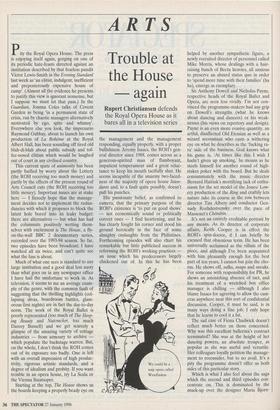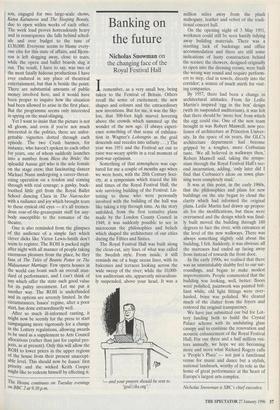ARTS
Trouble at the House again
Rupert Christiansen defends the Royal Opera House as it bares all in a television series Pity the Royal Opera House. The press is enjoying itself again, gorging on one of its periodic hate-feasts directed against an institution described by that fearless pundit Victor Lewis-Smith in the Evening Standard last week as 'an elitist, indulgent, inefficient and preposterously expensive house of camp'. (Almost all the evidence he presents to justify this view is ignorant nonsense, but I suppose we must let that pass.) In the Guardian, Joanna Coles talks of Covent Garden as being 'in a permanent state of crisis, run by chaotic managers alternatively motivated by ego, spite and whimsy'. Everywhere else you look, the impresario Raymond Gubbay, about to launch his own production of La Boheme at the Royal Albert Hall, has been sounding off tired old blah-di-blah about public subsidy and tof- fee-nosed elitism which would be laughed out of court in any civilised country.
This current spate of animosity has been partly fuelled by worry about the Lottery (the ROH receiving too much money) and partly by the effects of the present round of Arts Council cuts (the ROH receiving too little money). Important issues are at stake here — I fiercely hope that the manage- ment decides not to implement the redun- dancies with which it proposes to block the latest hole bored into its leaky budget: there are alternatives — but what has had the columnists positively wetting them- selves with excitement is The House, a fly- on-the-wall BBC 2 documentary series, recorded over the 1993-94 season. So far, two episodes have been broadcast; I have watched all six twice, and can't quite see what the fuss is about.
Much of what one sees is standard to any large institution and a good deal less nasty than what goes on in any newspaper office I have had the misfortune to work in. As television, it seems to me an average exam- ple of the genre, with the common fault of suggesting that the thrilling highlights (col- lapsing divas, boardroom battles, glam- orous first nights) are in fact the day-to-day norm. The work of the Royal Ballet is poorly represented (too much of The Sleep- ing Beauty and Nutcracker, too much Darcey Bussell) and we get scarcely a glimpse of the amazing variety of cottage industries — from armoury to archive which populate the backstage warren. But, on the whole, I don't think the ROH comes out of its exposure too badly. One is left with an overall impression of high produc- tivity, rigorous artistic standards, and a degree of idealism and probity. If you want trouble in an opera house, try La Scala or the Vienna Staatsoper.
Starting at the top, The House shows us the boards keeping a properly beady eye on the management and the management responding, equally properly, with a proper bullishness. Jeremy Isaacs, the ROH's gen- eral director since 1988, comes across as a generous-spirited man of flamboyant, impatient temperament and a great reluc- tance to keep his mouth tactfully shut. He seems incapable of the smarmy two-faced- ness of the majority of opera house Inten- dants and, to a fault quite possibly, doesn't pull his punches.
His passionate belief, as confirmed to camera, that the primary purpose of the ROH's existence is 'to put on good shows' — not economically sound or politically correct ones — I find heartening, and he has clearly fought his corner and stood his ground heroically in the face of some almighty onslaughts from the Philistines. Forthcoming episodes will also chart his remarkable but little publicised success in reforming the ROH's working practices an issue which his predecessors largely chickened out of. In this he has been helped by another sympathetic figure, a newly recruited director of personnel called Mike Morris, whose dealings with a hair- raising bunch of Bectu heavies, all anxious to preserve an absurd status quo in order to 'spend more time with their families' (ha ha), emerge as exemplary.
Sir Anthony Dowell and Nicholas Payne, respective heads of the Royal Ballet and Opera, are seen less vividly. I'm not con- vinced the programme-makers had any grip on Dowell's strengths (what he knows about dancing and dancers) or his weak- nesses (his views on repertory and design). Payne is an even more evasive quantity, an artful, disaffected Old Etonian as well as a wizard accountant who casts a withering eye on what he describes as the 'fucking ra- ra' side of the business. God knows what his game is. 'At times like this I wish I hadn't given up smoking,' he moans as he steels himself for another round of high- stakes poker with the board. But he deals consummately with the music director Bernard Haitink's mortifying lack of enthu- siasm for the set model of the Jones/ Low- ery production of the Ring and craftily lets nature take its course in the row between director Tim Albery and conductor Gen- nady Rozhdestvensky over the pace of Massenet's Cherubin.
It's not an entirely creditable portrait by any means. As its director of corporate affairs, Keith Cooper is in effect the ROH's spin-doctor, if I can briefly be excused that obnoxious term. He has been universally acclaimed as the villain of the piece, and although I've been acquainted with him pleasantly enough for the best part of ten years, I cannot but join the cho- rus. He shows off, sulks, snaps and sneaks. For someone with responsibility for PR, he shows an astonishing absence of tact, and his treatment of a wretched box office manager is chilling — although I also blame Isaacs for agreeing to allow the cam- eras anywhere near this sort of confidential discussion. Cooper, it must be said, is in many ways doing a fine job: I only hope that he learns to cool it a bit.
The sad case of Fiona Chadwick doesn't reflect much better on those concerned. Why was this excellent ballerina's contract terminated? She was at the height of her dancing powers, an absolute trouper, as popular as she was useful and versatile. Her colleagues loyally petition the manage- ment to reconsider, but to no avail. It's a pity the programme doesn't offer us both sides of this particular story.
Which is what I also feel about the saga which the second and third episodes con- centrate on. This is dominated by the muck-up over the designer Maria Bjorn- son, engaged for two large-scale shows, Katya Kabanova and The Sleeping Beauty, due to open within weeks of each other. The work load proves horrendously heavy and in consequence she falls behind sched- ule and over budget to the tune of £130,000. Everyone seems to blame every- one else for this state of affairs, and Bjorn- son is left slogging away, close to tears, while the opera and ballet boards slug it out. The result, I have to say, was two of the most fatally hideous productions I have ever endured in any place of theatrical entertainment, but that is beside the point. There are substantial amounts of public money involved here, and it would have been proper to inquire how the situation had been allowed to arise in the first place. But the programme seems only interested in spying on the mud-slinging.
Yet I want to insist that the picture is not all gloom, and even if you're not much interested in the politics, there are unfor- gettable vignettes dotted through each episode. The two Crush barmen, for instance, who haven't spoken to each other for years, one of whom suddenly launches into a number from Bless the Bride; the splendid Aussie girl who is the sole female on the stage crew; that fascinating dancer Michael Nunn undergoing a career-threat- ening operation on a tendon and coming through with real courage; a gawky, buck- toothed little girl from the Royal Ballet School dancing Clara in The Nutcracker with a radiance and joy which brought tears to these cynical old eyes — it's all tremen- dous roar-of-the-greasepaint stuff for any- body susceptible to the romance of the theatre.
One is also reminded from the glimpses of the audience of a simple fact which clever dicks like Victor Lewis-Smith don't seem to register. The ROH is packed night after night with all manner of people taking enormous pleasure from the place, be they fans of The Tales of Beatrix Potter or The Midsummer Marriage. Few opera houses in the world can boast such an overall stan- dard of performance, and I can't think of any which offer the state such good value for its paltry investment. Let me put it another way. The ROH is underfunded and its options are severely limited. In the circumstances, Isaacs' regime, after a poor start, has done extraordinarily well.
After so much ill-informed ranting, it might now be seemly for the press to start campaigning more vigorously for a change in the Lottery regulations, allowing awards to be used as a supplement to Arts Council allocations (rather than just for capital pro- jects, as at present). Only this will allow the ROH to lower prices in the upper regions of the house from their present unaccept- able level. This should now be Isaacs' first priority and the wicked Keith Cooper might like to redeem himself by effecting it.
The House continues on Tuesday evenings on BBC 2 at 9.30 p.m.



























































 Previous page
Previous page